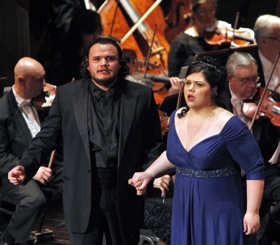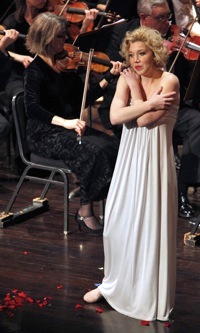Photos by Cory Weaver
At one of the finest Adler Showcases in recent memory, Sheri Greenawald and Mark Morash had the wisdom to frame each vocal set with powerhouse performances. Thus did San Francisco Opera Center’s general director and director of musical studies set the tone for "The Future Is Now," letting their singers proclaim loud and clear that the Adler opera apprentice Program is one of the world’s best.
At the front end, mezzo-soprano Maya Lahyani seared the audience that filled the acoustically challenged Herbst Theatre. Perfectly supported by the San Francisco Opera Orchestra, conducted by Morash, the first year Adler fellow’s sizzlingly sensual rendition of Dalila’s “Mon Coeur s’ouvre à ta voix” made clear that Samson’s hair was about to go. Curling body and lips, gyrating like a belly dancer in heat, Lahyani and her darkly dangerous instrument were ideal for both the enemy of the Hebrews and, in the second set opener, a Carmen who snarled at death. This is an instrument that could cut a man to pieces. Should it develop even more richness and plushness in the years ahead, Lahyani could very well have audiences worldwide at her feet.
Springing Loose

This we already know about the ability of two second-year Adler Fellows, soprano Leah Crocetto and tenor David Lomelí. Both closed the first set with Violetta’s great coloratura showpiece, “È strano … Ah, fors’è lui … Sempre libera.” With her hair and high range equally fabulous, Crocetto delivered an absolutely astounding, booming E flat in alto at the end of the cabaletta from the first act of La traviata. Coloratura Natalie Dessay can only dream of producing high notes of such power. It was as sensational as it was whole, healthy, and beautiful.
Less impressive, however, is Crocetto’s coloratura technique. It’s understandable that she wishes to retain the ability to sing lightly and with relative agility by tackling repertoire such as this and, at the recent Adler Fellows concert at Kohl Mansion, Mozart’s “Porgi amor.” But a live performance is not a practice session.
Related Articles
Young Artists Take Flight: From Adler Fellow to International Star
November 30, 2010
Soprano Leah Crocetto’s Career Takes Flight
April 9, 2010
Crocetto’s world-class instrument reveals an inherently dramatic spirit yearning to break free. Give her the duet from Rossini’s Guillaume Tell, “Ma présence pour vous … Oui, vous l’arrachez à mon âme,” which she sang with Lomelí in the second half, and she is totally in her element. I’d be happy to hear a recording of a soprano whose passionate climax to this scene tops Crocetto’s, but I doubt it exists. When Leah Crocetto and Elza van den Heever alternate in the role of Leonora in Il trovatore performances in Bordeaux this spring, the world will take notice.
The world is already taking notice of Lomelí, whose upcoming gigs around the world are to die for. Of concern, however, is his inclination to push his naturally lyric instrument to dramatic extremes. The audience may have gone wild at his final, tear-inducing “Nessun dorma,” but the purity of tone that he can produce was mostly absent. Nor can he match Crocetto for volume. (Few tenors can, and half of them are bulls.) Given Lomelí's frank proclamation that his voice is happiest singing Donizetti, I hope he will take heed of the example of José Carreras, who prematurely and irreparably damaged an essential lyric instrument by taking on heavy Verdi and Puccini roles.
More Wows

Susannah Biller, a first-year fellow, has already been turning heads with her exceptionally pointed, bright-as-blond soprano. As of last night, we know that she can walk center stage, completely poised and relaxed, and mesmerize in Ophélie’s ultimately demanding, high-flying mad scene from Thomas’ Hamlet. If this masterful artist, gifted with an exceptional instrument and arresting stage presence, can further develop her trill, she could well become another world-renowned former Adler of whom we can proudly say, “I heard her when.”
Countertenor Ryan Belongie, who dueted sublimely with Biller in Handel’s “Io t’abbraccio” from Rodelinda, could also benefit from a trill. The voice is quite agile, and quite lovely in lyric passages. When put under pressure, however, as in the showcase aria from Mozart’s early Mitridate, Re di Ponto that he sang in the second half of the concert, it can sound more pale than furious.
A big surprise was soprano Sara Gartland’s superb Thaïs. Severely overparted in her first act coloratura aria, Bellini’s “Ah rendetemi la speme … Qui la voce,” in which the two verses were delivered with borderline shrillness and virtually no differentiation, she returned with baritone Austin Kness and tenor Brian Jagde to sing the trio, "Étranger, te voilà comme tu l'avis dit" with far greater security. At home in her fach, Gartland became a dangerous beauty with a fine chest voice and near ravishing high notes.
Jagde sang very well as Don José (Carmen), Nicias (Thaïs), and Cavaradossi (Tosca). But on this occasion, most of his energy and bloom were confined to the high range. The lack of ping (at least in exceedingly dry Herbst) and a slightly malnourished midrange were drawbacks. There were cheers after his “E lucevan le stele,” but the beginning of the great aria from Tosca was dull.
When baritone Austin Kness first came on the scene as a shirtless Don Giovanni in Catherine Malfitano’s sensual Merola Opera production of Mozart’s opera, his fine voice and animal magnetism were show stopping. But that was in the relative confines of Cowell Theatre. What sounds like two years of attempts to enlarge the voice found the instrument unable to wrap itself around Ford’s monologue from Verdi’s Falstaff, and pushed as Athanaël in Thaïs.
The program began with Morash frenetically conducting the rousing overture from Glinka’s Ruslan and Lyudmila. Strange, perhaps, for singers who stuck to Italian and French, but successful in opening the metaphorical curtain on a powerhouse program. With fine harpsichord from Allen Perriello and celeste from Tamara Sanikidze, whose coaching was central to the evening’s success, the Adlers thrilled again and again.
